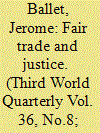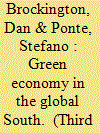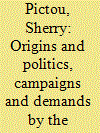| Srl | Item |
| 1 |
ID:
140962


|
|
|
|
|
| Summary/Abstract |
In this article we first point out that the different conceptualisations of Fair Trade, which are sometimes analytically contradictory, actually form a coordinated set. Understanding the Fair Trade project is impossible without taking these interlinked conceptualisations into consideration. Second, this set basically forms a mechanism of structural, institutional and moral reforms that guide actions. In this way Fair Trade sets out to produce less injustice than is usually the case with the structures and institutions that govern conventional trade. Nevertheless, it does not try to define what a just society is or even to perfectly define ‘fair trade’. This implies the adoption of a comparative justice angle. It is precisely by linking comparative individual situations with the structures that produce these situations that relative justice can find its strength and purpose.
|
|
|
|
|
|
|
|
|
|
|
|
|
|
|
|
| 2 |
ID:
154068


|
|
|
|
|
| Summary/Abstract |
Fair trade seeks to promote the well-being and empowerment of farmers and workers in the Global South. This article traces the contested growth and configuration of Fairtrade International labour certification, providing a multifaceted and dynamic view of private regulation. I explain why Fairtrade International began certifying large enterprises and how its hired labour strategy has developed over time, illuminating fair trade’s move from peasant to plantation sectors, stakeholder involvement in shaping the growth of Fairtrade labour certification, the internal and external balancing of farmer and worker concerns, and major innovations in Fairtrade’s ‘New Workers Rights Strategy’. My findings challenge the claim that recent market mainstreaming explains the rise of labour certification within fair trade and the more general argument that private regulatory programmes founded to foster empowerment evolve over time to prioritise a logic of control. As I document, Fairtrade International has recently moved to bolster producer power within its organisation and labour rights within its certification programme. My analysis reveals the dynamic nature of private regulatory programmes and the potentially influential role of diverse stakeholders in shaping the priorities of Fairtrade and other labour-standards systems.
|
|
|
|
|
|
|
|
|
|
|
|
|
|
|
|
| 3 |
ID:
142654


|
|
|
|
|
| Summary/Abstract |
As multiple visions for a Green Economy seek to become real, so are green economic initiatives in the global South multiplying. These can offer integration into wealth-generating markets – as well as displacement, alienation, conflict and opportunities for ‘green washing’. The articles included in this collection bring together a multidisciplinary team of scholars and a range of case studies, from forestry governance to tourism to carbon finance, to provide nuanced analyses of Green Economy experiences in the global South – examining the opportunities they provide, the redistributions they entail and the kinds of resistance they face.
|
|
|
|
|
|
|
|
|
|
|
|
|
|
|
|
| 4 |
ID:
162626


|
|
|
|
|
| Summary/Abstract |
This reflective contribution discusses the intersection of Indigenous and Small Scale Fisheries’ (SSF) issues, and how the international SSF movement has a critical role in the broader struggle for the convergence of social justice regarding the environment, food and lifeways. I explore some of the political tensions around Indigenous and SSF struggles against global neoliberalisation of land and water resources, some of the successes and challenges of the international SSF movement, and future considerations for academic/activist ‘decolonising’ work.
|
|
|
|
|
|
|
|
|
|
|
|
|
|
|
|
| 5 |
ID:
162627


|
|
|
|
|
| Summary/Abstract |
This reflective contribution discusses the intersection of Indigenous and Small Scale Fisheries’ (SSF) issues, and how the international SSF movement has a critical role in the broader struggle for the convergence of social justice regarding the environment, food and lifeways. I explore some of the political tensions around Indigenous and SSF struggles against global neoliberalisation of land and water resources, some of the successes and challenges of the international SSF movement, and future considerations for academic/activist ‘decolonising’ work.
|
|
|
|
|
|
|
|
|
|
|
|
|
|
|
|
| 6 |
ID:
163050


|
|
|
|
|
| Summary/Abstract |
This article provides a critical examination of the current extensive promotion of ‘self-reliance’ for refugees. The existing scholarship largely ignores the unsuccessful historical record of international assistance to foster refugees’ self-reliance and fails to discuss its problematic linkages to neoliberalism and the notion of ‘dependency’. The article reveals that the current conceptualisation and practice of self-reliance are largely shaped by the priorities of international donors that aim to create cost-effective exit strategies from long-term refugee populations. The authors argue that where uncritically interpreted and applied, the promotion of self-reliance can result in unintended and undesirable consequences for refugees’ well-being and protection.
|
|
|
|
|
|
|
|
|
|
|
|
|
|
|
|